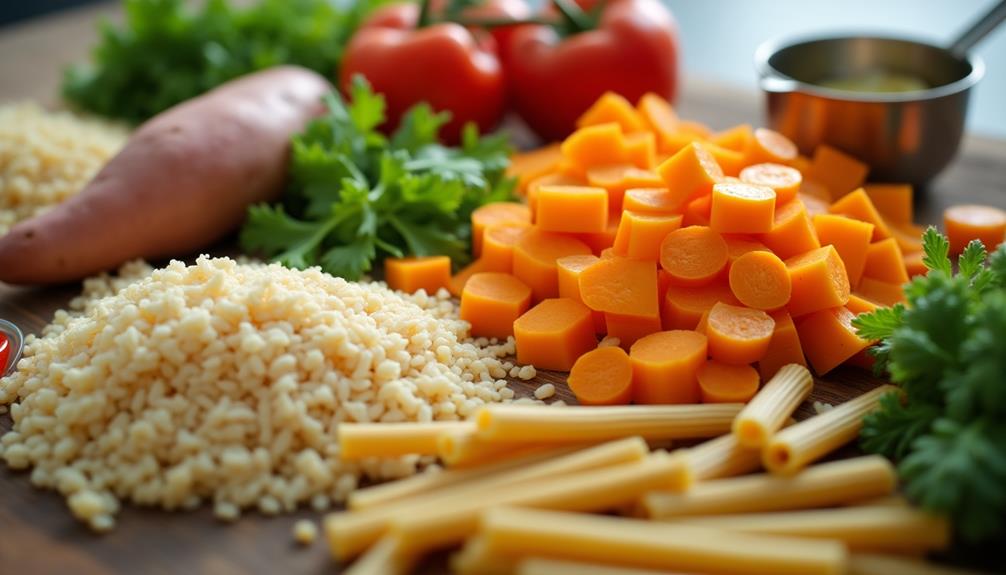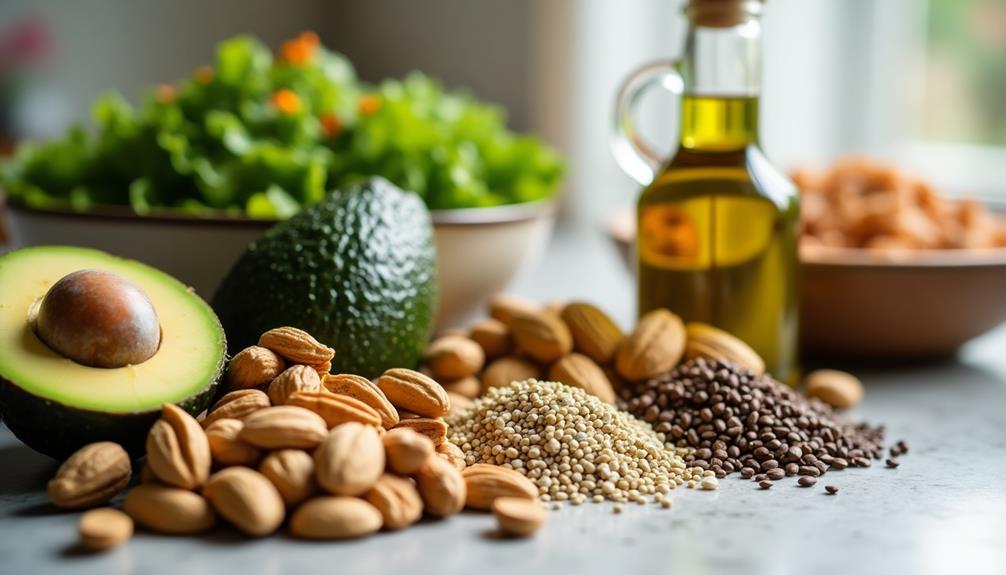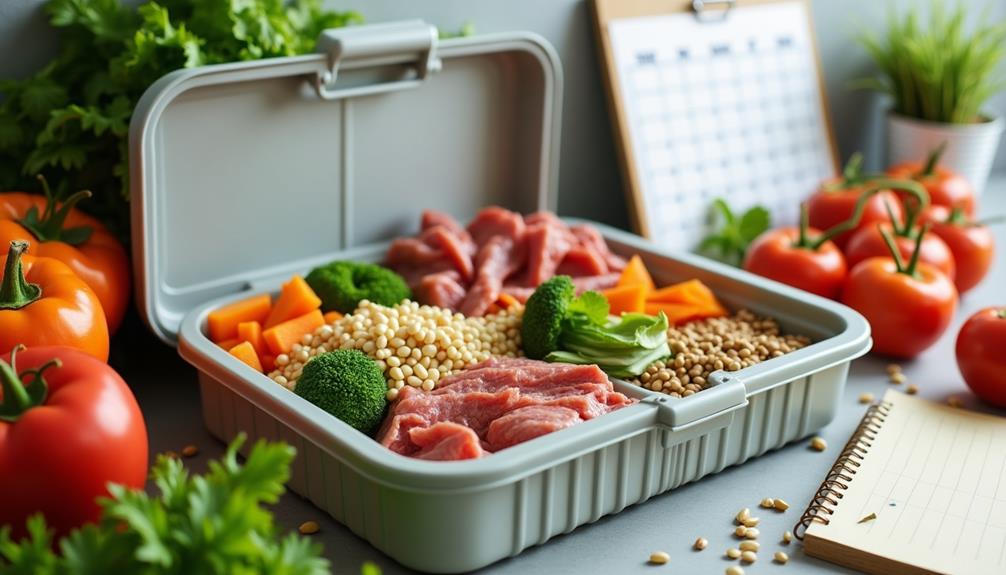To succeed in bulking nutrition, start by understanding your caloric needs. Aim for a daily surplus of 250 to 500 calories. Prioritize protein intake by consuming 1.6-2.2 grams per kg of body weight, focusing on high-quality sources. Choose unprocessed carbohydrates like brown rice and sweet potatoes for energy, and don't forget healthy fats for hormone production. Meal planning is essential—prep in advance to stay consistent. Monitor your progress and adjust portions as needed. Finally, consider supplements like protein powder or creatine to support your goals. Keep these tips in mind, and you'll set yourself up for success while uncovering even more insights.
Core Insights
- Calculate your Total Daily Energy Expenditure (TDEE) and add a surplus of 250-500 calories to promote muscle gain.
- Prioritize protein by consuming 1.6-2.2 grams per kg of body weight daily from high-quality sources like lean meats and beans.
- Choose whole, unprocessed carbohydrates such as brown rice and sweet potatoes for stable energy and essential nutrients.
- Incorporate healthy fats from sources like avocados, nuts, and olive oil to support hormone production and nutrient absorption.
- Plan and prep your meals in advance to maintain portion control and ensure alignment with your nutrition goals.
Understand Your Caloric Needs

To effectively bulk up, you need to grasp your caloric needs as the foundation of your nutrition plan. Start by calculating your Total Daily Energy Expenditure (TDEE). This number reflects how many calories you burn in a day, considering factors like activity level and metabolism. Once you have your TDEE, add a surplus—typically around 250 to 500 calories—to promote muscle gain. For those looking to maximize their gains, following a clean bulking plan can help ensure you're getting the right nutrients without excess fat gain. Monitor your progress weekly; if you're not gaining weight, adjust your intake accordingly. Remember, it's not just about eating more; focus on quality calories from whole foods. Incorporating healthy fats, complex carbs, and nutrient-dense options supports your overall health. Consistency is key, so stick with your plan and make adjustments as needed for best results.
Focus on Protein Intake

After establishing your caloric needs, prioritizing protein intake becomes essential for muscle growth. Protein plays a key role in repairing and building muscle tissue, so aim for about 1.6 to 2.2 grams of protein per kilogram of body weight. You can achieve this by incorporating high-quality protein sources into your meals. Think lean meats, fish, eggs, dairy, and plant-based options like beans and lentils. When selecting protein sources, consider ingredient quality and absorption to maximize the benefits for your bulking goals. Opt for products with high bioavailability to ensure your body can effectively utilize the nutrients.
Distributing your protein intake evenly throughout the day can enhance muscle protein synthesis. Consider having protein-rich snacks, like Greek yogurt or protein shakes, between meals. This approach not only supports your bulking goals but also keeps you feeling satisfied. Remember, consistency is key; make protein a priority in your daily nutrition plan for best results.
Choose Quality Carbohydrates

Choosing high-quality carbohydrates is essential for fueling your workouts and supporting muscle growth during a bulking phase. Focus on whole, unprocessed options like brown rice, quinoa, oats, and sweet potatoes. These foods provide not only energy but also essential nutrients and fiber, which aid digestion. For peak recovery, consider incorporating post-workout recovery drinks that contain a blend of carbohydrates and proteins to replenish glycogen stores and support muscle repair.
When selecting carbohydrates, prioritize those with a low glycemic index. They release energy slowly, helping you maintain stable blood sugar levels throughout the day.
Don't overlook fruits and vegetables; they're packed with vitamins and minerals that support overall health.
Strive to incorporate carbohydrates into every meal, ensuring you have enough energy for intense training sessions. By selecting the appropriate carbs, you'll enhance your performance and maximize your muscle-building potential.
Include Healthy Fats

Healthy fats play an important role in your bulking nutrition plan, providing essential fatty acids that support hormone production, energy levels, and nutrient absorption. Incorporating healthy fats into your diet can help you reach your caloric goals while promoting overall health.
Focus on sources like avocados, nuts, seeds, and olive oil. These foods not only add flavor but also deliver crucial nutrients. Aim to include these fats in your meals and snacks, balancing them with quality carbohydrates and protein.
Plan Your Meals Ahead

Here's a simple meal planning table to help you get started:
| Meal | Foods to Include |
|---|---|
| Breakfast | Oats, eggs, banana |
| Lunch | Chicken, rice, veggies |
| Dinner | Salmon, quinoa, spinach |
Consider prepping your meals in advance to save time during the week. This not only guarantees you stick to your nutrition goals but also helps you manage portion sizes effectively.
Stay Hydrated

Hydration plays a crucial role in your bulking journey, impacting everything from muscle recovery to overall performance. Staying properly hydrated ensures your body functions efficiently and supports your growth goals. Here are three key reasons to prioritize hydration:
- Muscle Recovery: Water helps transport nutrients to your muscles, aiding in recovery and growth after intense workouts.
- Performance: Dehydration can lead to fatigue and reduced strength, so drinking enough water can keep your energy levels high during training sessions.
- Appetite Regulation: Staying hydrated can help control your appetite, making it easier to consume the necessary calories for bulking.
Aim to drink plenty of water throughout the day, especially before, during, and after workouts. Your body will thank you as you progress on your bulking journey.
Monitor Your Progress

Tracking your progress is essential to ensuring your bulking nutrition strategy is effective. Start by keeping a detailed food journal. Note what you eat, portion sizes, and meal timings. This helps you identify patterns and make adjustments when needed.
Next, take regular measurements of your weight and body composition. Weekly weigh-ins can provide insights into your progress. Don't forget to take progress photos too; visual comparisons can be motivating.
Lastly, listen to your body. Are you feeling energized? Are your workouts improving? These indicators can help you assess whether your nutrition plan is working. By monitoring your progress consistently, you can fine-tune your bulking strategy, ensuring you're on the right path to achieving your goals. Stay committed and adapt as necessary!
Incorporate Nutrient Timing

Incorporating nutrient timing into your bulking nutrition plan can greatly enhance your results. By strategically planning when you eat, you can optimize muscle growth and recovery. Here are three key times to focus on:
- Pre-Workout: Fuel up with a balanced meal or snack 1-2 hours before your workout. This should include carbs and protein to provide energy and support muscle performance.
- Post-Workout: Consume a protein-rich meal or shake within 30 minutes of finishing your workout. This helps kickstart muscle recovery and growth.
- Before Bed: Have a slow-digesting protein source like casein to provide your muscles with nutrients overnight. This can help maximize recovery and muscle synthesis while you sleep.
Adjust Portions as Needed

Adjusting your portion sizes is vital for optimizing your bulking nutrition. You might start with a baseline of calories, but as your body adapts, you'll need to tweak those portions. Monitor your weight and muscle gains weekly. If you're not seeing progress, increase your portions slightly. On the flip side, if you're gaining too much fat, scale back a bit.
Focus on whole foods like lean proteins, healthy fats, and complex carbs. Use measuring cups or a food scale to guarantee accuracy. It's also helpful to track your meals in an app or journal. This way, you'll have a clear picture of what works for you. Remember, adjusting portions is a continuous process, so stay flexible and attentive to your body's signals.
Supplement Wisely

When contemplating your bulking nutrition, selecting the right supplements can make a significant difference in your progress. Supplements can help fill nutritional gaps and support your muscle-building goals. Here are three key supplements to take into account:
- Protein Powder: It's an easy way to make sure you're hitting your daily protein targets, especially post-workout. Look for whey or plant-based options that suit your dietary preferences.
- Creatine: This supplement can boost your strength and recovery, allowing for more intense workouts. It's one of the most researched supplements available.
- Branched-Chain Amino Acids (BCAAs): They can help decrease muscle soreness and enhance recovery times, making them a valuable addition to your regimen.
Always consult with a healthcare professional before starting any new supplement to make sure they align with your overall health and fitness goals.
Frequently Asked Questions
Can I Bulk Without Consuming Dairy Products?
Absolutely, you can bulk without dairy! Think of it as building a house; you just need the right materials. Focus on protein-rich alternatives like legumes, nuts, and lean meats to fuel your growth effectively.
How Do I Manage Cravings During a Bulking Phase?
Managing cravings during a bulking phase can be tricky. Focus on high-protein snacks, stay hydrated, and keep your meals balanced. Distract yourself with activities or hobbies, and remember your goals to stay motivated!
Is It Safe to Bulk While Following a Vegetarian Diet?
Yes, it's safe to bulk on a vegetarian diet. You just need to make sure you're getting enough protein, calories, and essential nutrients from plant-based sources like legumes, nuts, seeds, and whole grains to support muscle growth.
What Snacks Are Best for Quick Energy During Bulking?
When hunger strikes like a thunderstorm, quick energy snacks become your lifeline. Grab nuts, energy bars, or Greek yogurt. They'll fuel your workouts and keep you on track, ensuring you're ready to conquer your goals!
How Do I Deal With Digestive Issues From Increased Food Intake?
When you increase your food intake, digestive issues can arise. To manage this, try eating smaller, more frequent meals, staying hydrated, and incorporating fiber gradually. Also, listen to your body and adjust accordingly.

